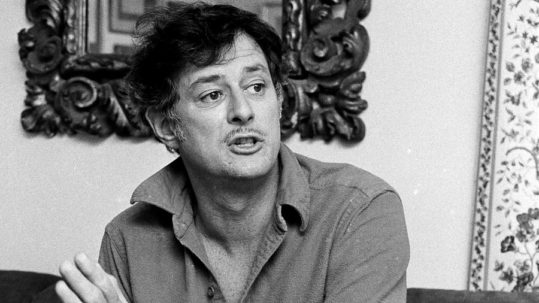
Frank Deford died on Sunday at the age 78. For sports fans (not just baseball fans) of my generation, both his writing and his speaking about sports was as good as you could get. His ability to put you at the scene of an event, to explain the importance of a moment or something larger, and his use of language to do so was, for me, mesmerizing.
There have been a number of articles and tributes to him already, and I suspect many more will be written over the days to come. This one, by Joe Posnanski, tells about the impact Deford had on one of our current best sports writers (in my opinion) and why he believes “Frank was the greatest sportswriter there ever was.”
A Toast to the Best, by Joe Posnanski, May 29 on the death of Frank Deford.
Update 9 PM, 5/30 – For those who want to know more about Deford, see this NPR post: The Best of Frank Deford, According to Frank Deford.


Land Wayland said:
Well, if you hadn’t sent it to me, I would have sent it to you. Thanks.
The Duke of Brooklyn said:
I have listened to him every Wednesday morning on NPR since “The Ole RedHead”
died many years ago….He — they — were such a refreshing voice in an often
borrrrrrrrring set of daily ‘talking heads’.
May he rest in Peace!
Richard said:
The Washington Post’s wonderful sportswriter, Tom Boswell, wrote the following today about Deford:
“Frank Deford was, and remains, my favorite sportswriter. Of course, I have no idea who is “best” or how you would decide. But I can certainly know MY favorite — strictly in terms of my delighted anticipation, for at least 25 years — at whatever his next major piece might be in Sports Illustrated. He analyzed and understood people’s characters better, and in more depth, than anybody else. And that, for me, is the top prize in the game. In the novel, you are unaccountable to any reality except your own internal vision. You can be unconvincing, but you can’t be “wrong” — because your characters are your creations. In some ways, it always struck me as a low bar. Also, in many cases, biography is posthumous. The living person — his best friends and worst enemies — are no longer there to contradict the biographer’s version, no matter how well researched. It’s much harder to try to write not just in depth but to the center of the person — as Deford did with Bobby Knight, for example — in a way that is relentlessly honest and absolutely as critical as demanded, yet has a central breadth of understanding for people and a compassion that drives the whole project. Frank never liked easy subjects to praise or rip. He wanted the most complex people, but he also chose to write about people that he sensed or guessed had not been understood in anything like the depth that could be reached. Then, metaphorically, he showed up the next day, and the next year, to face and talk with and probably laugh with the people he had written about. He had such a genuine relationship with the people he wrote about, and they sensed his concern and decency so much, that they opened up to him and trusted him with more of their story than they’d ever told. And they knew he’d talk to everybody else about them, too — pro, con and inexplicable. Frank didn’t deconstruct people, he left them whole, as they really were and, perhaps, still essentially mysterious.
In other words, he chose to do what is most difficult. And what is much too often avoided in what now tries to pass itself off as journalism, or analysis, in the hot-take, look-at-me parts of sports coverage. The very phrase “hot-take” condemns itself as shallow and insincere.
It’s said that, when studying almost any other person, “To know all is to forgive all.” That is the source of literary compassion. The deeper you dig, the more you understand, the less you tend to judge and the harder, but more honorable, the writing.
Concerning the attempt, amid constant failures, perhaps simply different degrees of failure, to do this most difficult thing — write well — William Butler Yeats wrote a poem in 1914: “To a Friend Whose Work Has Come to Nothing.”
“Now all the truth is out,/ be secret and take defeat/ From any brazen throat,/ For how can you compete,/ Being honour bred, with one/ Who, were it proved he lies,/ Were neither shamed in his own/ Nor in his neighbors’ eyes?
“Bred to a harder thing/ Than Triumph, turn away/ And like a laughing string/ Whereon mad fingers play/ Amid a place of stone,/ Be secret and exult,/ Because of all things known/ That is most difficult.” ”
— May 30, 2017 1:13 EDT